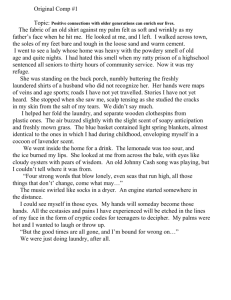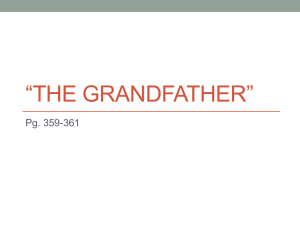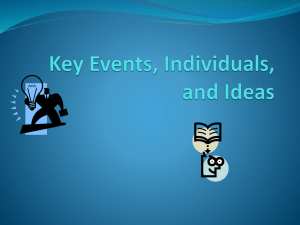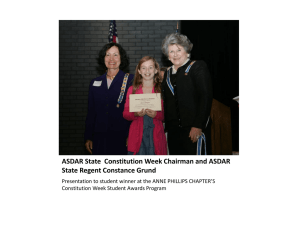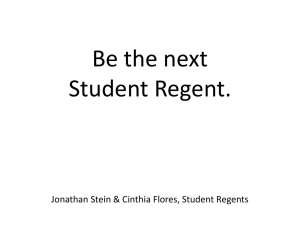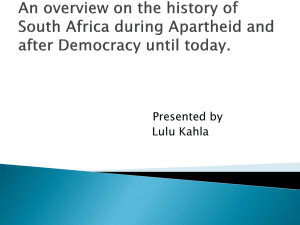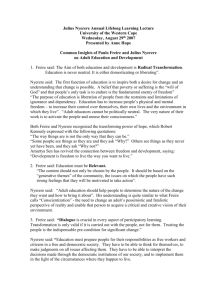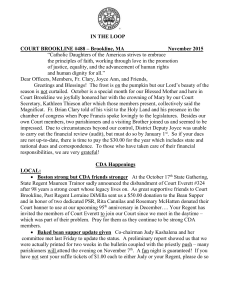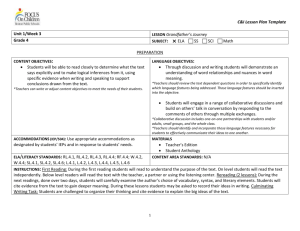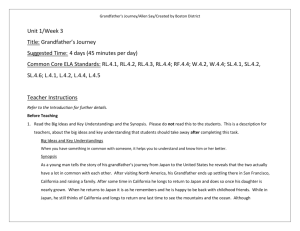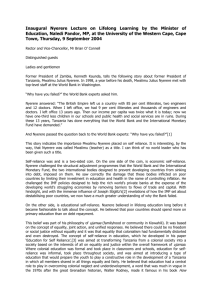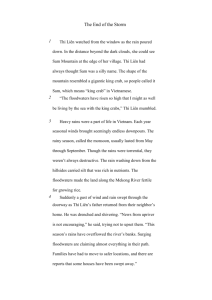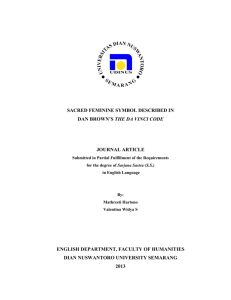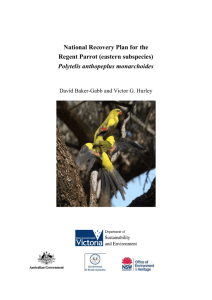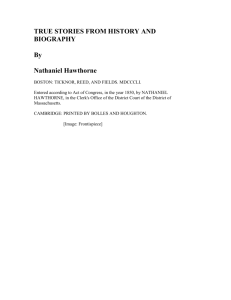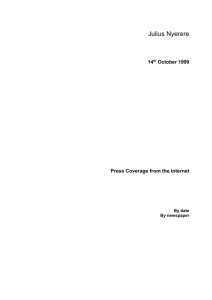Business woman and director for the KwaZulu
advertisement
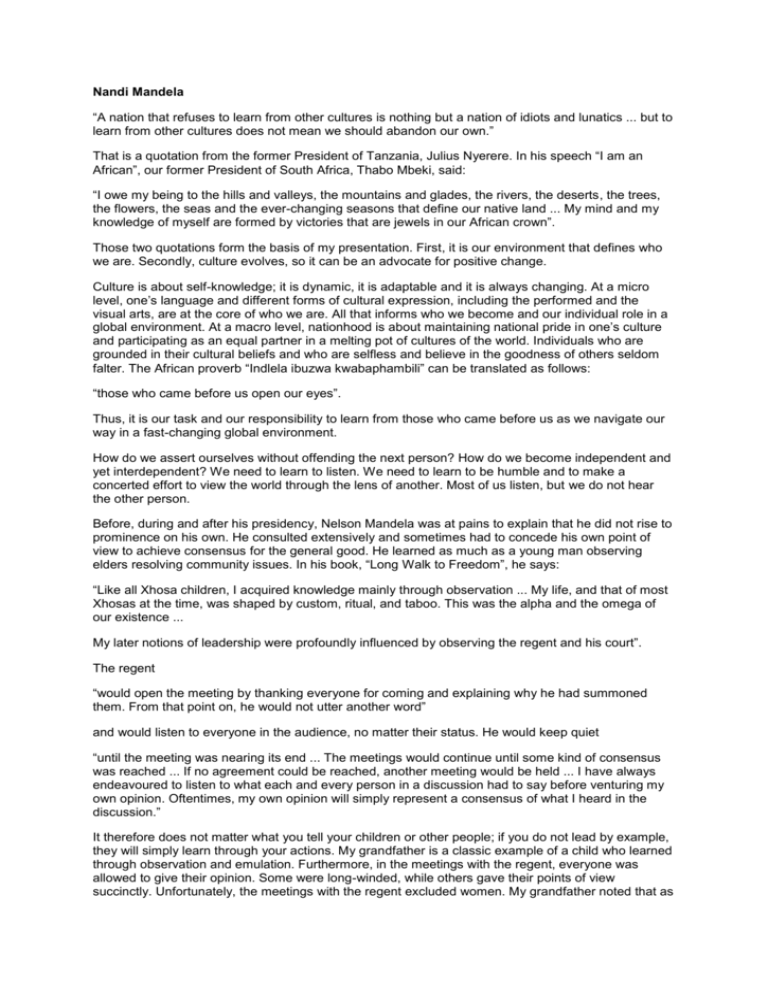
Nandi Mandela “A nation that refuses to learn from other cultures is nothing but a nation of idiots and lunatics ... but to learn from other cultures does not mean we should abandon our own.” That is a quotation from the former President of Tanzania, Julius Nyerere. In his speech “I am an African”, our former President of South Africa, Thabo Mbeki, said: “I owe my being to the hills and valleys, the mountains and glades, the rivers, the deserts, the trees, the flowers, the seas and the ever-changing seasons that define our native land ... My mind and my knowledge of myself are formed by victories that are jewels in our African crown”. Those two quotations form the basis of my presentation. First, it is our environment that defines who we are. Secondly, culture evolves, so it can be an advocate for positive change. Culture is about self-knowledge; it is dynamic, it is adaptable and it is always changing. At a micro level, one’s language and different forms of cultural expression, including the performed and the visual arts, are at the core of who we are. All that informs who we become and our individual role in a global environment. At a macro level, nationhood is about maintaining national pride in one’s culture and participating as an equal partner in a melting pot of cultures of the world. Individuals who are grounded in their cultural beliefs and who are selfless and believe in the goodness of others seldom falter. The African proverb “Indlela ibuzwa kwabaphambili” can be translated as follows: “those who came before us open our eyes”. Thus, it is our task and our responsibility to learn from those who came before us as we navigate our way in a fast-changing global environment. How do we assert ourselves without offending the next person? How do we become independent and yet interdependent? We need to learn to listen. We need to learn to be humble and to make a concerted effort to view the world through the lens of another. Most of us listen, but we do not hear the other person. Before, during and after his presidency, Nelson Mandela was at pains to explain that he did not rise to prominence on his own. He consulted extensively and sometimes had to concede his own point of view to achieve consensus for the general good. He learned as much as a young man observing elders resolving community issues. In his book, “Long Walk to Freedom”, he says: “Like all Xhosa children, I acquired knowledge mainly through observation ... My life, and that of most Xhosas at the time, was shaped by custom, ritual, and taboo. This was the alpha and the omega of our existence ... My later notions of leadership were profoundly influenced by observing the regent and his court”. The regent “would open the meeting by thanking everyone for coming and explaining why he had summoned them. From that point on, he would not utter another word” and would listen to everyone in the audience, no matter their status. He would keep quiet “until the meeting was nearing its end ... The meetings would continue until some kind of consensus was reached ... If no agreement could be reached, another meeting would be held ... I have always endeavoured to listen to what each and every person in a discussion had to say before venturing my own opinion. Oftentimes, my own opinion will simply represent a consensus of what I heard in the discussion.” It therefore does not matter what you tell your children or other people; if you do not lead by example, they will simply learn through your actions. My grandfather is a classic example of a child who learned through observation and emulation. Furthermore, in the meetings with the regent, everyone was allowed to give their opinion. Some were long-winded, while others gave their points of view succinctly. Unfortunately, the meetings with the regent excluded women. My grandfather noted that as a young man, and later in his life, he learned from that experience and adapted—in the same way that culture itself is adaptable—to include women in public discourse. He also appointed women to important positions in his Cabinet in support of his organisation’s policies. My grandfather found a home in the African National Congress because it emulated his experiences as a young man. In the ANC, there is extensive consultation and debate before any decisions are made, and it became an extension of what happened in his rural life as he was growing up—finding himself on the world stage was simply a natural progression. The difference was that the ANC had a wider geographical outreach and later included a women’s league that represented an additional sector of society. Why is that relevant to us today? Because we live in a fast-changing global environment that changes everything that we do daily. How do we maintain cultural autonomy while creating a homogeneous cultural identity? Do we have to be homogeneous or should we think about creating a mosaic of different cultural personalities? At this point, I want to consider other world-renowned leaders at different periods in history. Sir William Wallace was a leader of the Scottish resistance forces who liberated his country from domination by the English; Winston Churchill was an orator, a writer, an artist and the United Kingdom’s Prime Minister during world war two who also won a Nobel prize for literature; Shaka Zulu was a great warrior known for his military strategies; Abraham Lincoln, who is known for his role in preserving the union and ending slavery, came from humble beginnings, which informed his passion to abolish slavery; and Julius Nyerere, the first President of Tanzania, is fondly remembered by his countrymen and women as Mwalimu, which means “teacher”. In the recent past, we have Nelson Mandela, who was a fierce freedom fighter from humble beginnings and a political prisoner who became a President. The common theme for all those esteemed gentlemen is resilience and the triumph of their human spirit, qualities that can serve as a guide to all of us in the fast-changing global environment. We need to fight for what we believe in. We need to include culture in all the things that we do, because that is who we are, at a personal level. We need to become selfless in our deeds. The world is a very distressed environment. Good men and women with good intentions for the general good of humankind are what we need in today’s world. Humanity is in dire need of peaceful co-existence, and the lessons from those who came before us will stand us in good stead as we forge our way towards a unified global environment. A quotation from former USA President, Abraham Lincoln, puts that into proper perspective: “with malice towards none, with charity for all, with firmness in the right … let us strive on to finish the work we are in, to bind up the nation’s wounds.” I will give you another quotation from my grandfather, from his book, “Conversations with Myself”. “I have walked that long road to freedom. I have tried not to falter; I have made missteps along the way. But I have discovered the secret that after climbing one great hill, one only finds that there are many more hills to climb. I have taken a moment here to rest, to steal a view of the glorious vista that surrounds me, to look back on the distance I have come. But I can only rest for a moment, for with freedom comes responsibilities, and I dare not linger, for my long walk has not ended.” Lest we forget where we come from, let us remember that our work is still far from over. Consistency in private and in public is vital. It starts with the family unit. Having been imprisoned for a very long time, my grandfather did his best to ensure that his family was taken care of with his own resources. He did not stop there. He went further in his public life and bequeathed his salary to start a foundation to help the less privileged. His selflessness was an act of love that extended to those he knew and to those he did not know. It is also said that President Julius Nyerere’s salary was lower than that of his ministers. Those examples provide us with the most profound lessons and demonstrate an amazing ability to reach out. We need to focus on being selfless and do what is good for the general good of our nations and for individuals. My questions are to this audience, and beyond. If you love Nelson Mandela, what are the lessons that you can take from his time on earth? Are we doing the same as him, or are we just going to lament him and say what a good person he was? What are we prepared to do, and how far can we go to live by those principles? What about the people who surround you every day at work and at home? There is still more work to be done. It is up to you and me to do our bit.

